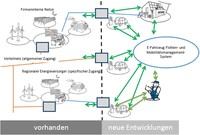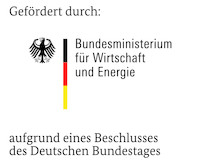
EMiLippe: Elektromobilität in Lippe

Motivation
The requirements of the mobility in rural area are fundamentally different as compared to the urban area. The number of second cars as well as the amount of driven kilometers are significantly higher and alternatives transportation possibilities worse. This is not only the case for private mobility but also for the mobility in economic transportation. Those economic transactions allow e.g. travelling of employees between factory locations and to costumers, as well as delivery of services and traffic at factory premises. To overcome the consumption of fossil energy resources, the electro mobility becomes even more attractive for companies. However, to use this technology several challenges as mobility management of electric cars at the company level.
Research Challenges
Actual electric vehicles have low range (appr. 150km per battery charge), what requires well planned travelling and avoidance of waiting times caused by battery charging. Therefore, things like different driving profiles, weather (capacity of batteries are less in winter), as well as the energy consumption due to different routes (mountains, inner-city) has to be taken into consideration for the automatic planning of the fleet management. Furthermore, one objective of this project is a high usage of renewable energy or even self-generated energy for charging the e-cars. Therefore, an intelligent carport with a charging stations is necessary to charge the e-cars based on weather forecasts with renewable energy if available or with conventional energy. Alternatively, surplus of the generated energy will be delivered to the storage or can directly flow into the smart grid. Thus, an interconnection (electrical and communication) between the micro grid (at the company side) with the smart grid is necessary. Furthermore, in order to exchange information such as actual charging state, operating date and operating time of an e-car as well as energy tariff a robust and reliable interconnection of the different sub-systems (e-cars, intelligent carports, e-mobility- and fleet management systems and smart grid) is necessary. Therefore, plug-and-play mechanisms will be explored to enable discovery, self-configuration and self-adaption of the different sub-system in an open system architecture such as the internet to ensure an optimal utilization of the e-mobility- and fleet management system. Furthermore, adaptive user interfaces will be investigated to ensure simple operation of cognitive human machine interfaces. Therefore, possibilities and concepts to increase the usability will be explored in order to achieve the usability level as in case of mobile devices such as smartphones. The necessary information, like positioning, next charging possibility or actual energy costs shall be placed in a context-sensitive way.

